What needs to go in your freelance writing contract to protect you and your clients.
As a newbie freelance writer, it’s encouraging to find your first client or two. In the initial excitement, you may jump directly into the project without a second thought. But that’s a huge mistake—you need a freelance writing contract in place before you begin work.
If the thought of creating a freelance writing contract overwhelms you because you don’t want to scare potential clients off, that’s ok. Almost every other freelance writer starts out the same way.
I’m embarrassed to say that I didn’t have a contract for several of my first freelance writing clients and nothing went wrong. But I was extremely lucky.
Making a freelance contract doesn’t have to be hard. You can pay a lawyer (a whole lot of money) to have one professionally drafted, or you can look online and find examples of freelancing contracts that you can use.
You can also just create your own contract. But I have an even better solution that we’ll talk about later. (Here’s a hint, it has to do with a lawyer and the templates she created to help bloggers and online business owners.)
No matter which option you choose, there are certain key provisions necessary for a freelance writing contract that protects.
Related: How to Create a Sensational Freelance Writing Portfolio
Why You Need a Freelance Writing Contract
A freelance contract spells out the terms of the project for both sides. It doesn’t just protect you. It protects your client as well. A contract lets them know what they can expect from you and when they need to pay you for your services.
After a while, this may be a simple email as a long-term working relationship grows, but in general, a contract is necessary.
Once a contract is in place, it protects you in case a client fails to pay for your work. Most clients pay promptly, but there may be some exceptions and you certainly rely on that money to pay your bills, right?
It also protects your client and provides them the peace of mind that terms are clearly laid out and that their projects will be turned in on time. There’s no need for extensive conversations back and forth about due dates, privacy statements, payment terms, and more.
What Goes in a Freelance Writing Contract?

Describe the Project and Scope of Work
First, there should be a project description in your contract. As a freelance writer, the project might be to simply “write ten blog posts.” But this description does not include the scope of work such as word count, uploading the post into WordPress, or how many revisions you agree to.
With revisions, you should set a specific number and charge extra for additional editing. You may also want to add a time limit for revisions, so a client isn’t calling you three weeks later for editing.
Instead, make your product description clear, so there’s no room for misunderstandings. Try describing your project like this, “Freelancer will write 10 blog posts (no more than 5,000 words) for $1,000 (USD). The freelancer will provide two revisions for each blog post.”
Detailing the scope of the project eliminates any confusion about the services agreed upon. If a client wants work that exceeds the additional scope of the project, then you should complete another contract for any more work that the client wants.
Related: 10 Types of the Best Professional Writing Projects You Can Make Money Doing
State the Deadline
Every freelance writing contract should state a clear deadline for projects. A clear deadline gives you an end date, so the client can’t drag the project out forever. You could say, “Freelance writer and client agree to have the project finished on or by September 30th, 2020. Exceptions to this deadline include serious injury, an act of God, or an unexpected medical emergency.”
Meeting a client’s deadlines is critical to your success as a freelance writer. Because I’m rarely late turning in projects (even if the timelines are ridiculous), my clients trust me and know I’ll do what it takes to make a deadline. The downside is you can get taken advantage of. When you meet ridiculous deadlines, your client may come to expect that.
Long-term projects can still have a timeline, as well. For example, you might say, “Freelancer will submit 15 articles to the client on the 30th day of each calendar month”. Adding this description makes it clear when a client can expect to receive the next batch of articles.

Compensation
Getting paid is a pretty big deal, right? So, it’s no surprise that compensation is a key provision in a freelance writing contract. But there are some terms you may not be familiar with that you should consider including in the contract.
Replenishing Retainer
A replenishing retainer helps ensure you have a steady cash flow coming in and protects you against nonpayment for the work you complete for a client. A retainer is a set amount of money that a client pays you in advance. It’s either your set hourly rate or a fixed amount billed against the retainer.
The way a replenishing retainer works is that when the retainer falls below a set amount as you start billing your client, they must replenish the retainer. So, if your set amount is $600 and it falls to $100 as you start billing the client for the work you complete, it’s up to the client to replenish to the established $600 set amount.
These retainers also work for your clients who pay a subscription rate or flat fee. In these cases, a client pays you a specific amount of money every quarter, month, or year. You simply don’t begin your working on their projects until they pay that specific sum.
Make an Upfront Deposit Part of Your Freelance Writing Contract
Some clients may not agree with a replenishing retainer. If they don’t, you should always get a deposit upfront before you start working. A deposit protects you in case something happens like your client’s business crumbles or they unexpectedly terminate the project.
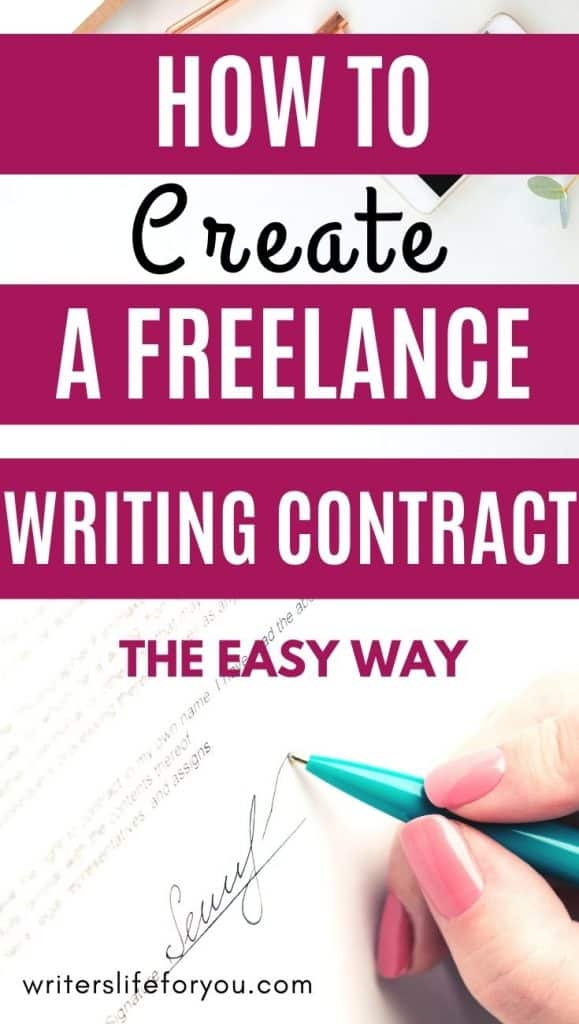
Late Payments
Please, please, please always include terms that support you in case a client plays late. Late fees encourage people to pay you on time, and if they don’t, you’re entitled to compensation for the effect that late payments have on your business’s cash flow.
Kill Fees
A kill fee provision is an excellent provision to include in your freelance writing contract. It protects you in case a client decides to end the project unexpectedly after you’ve already started working on it.
A deposit isn’t going to cover you if a client kills the project completely. It protects you to a certain point, but a kill fee provision covers the other half of the money you would have received.
Include Attorney Costs and Fees
No one expects to need an attorney when you first sign on a client. It’s a time to rejoice and celebrate, right? Well, even the best of client-freelancer relationships can go down the toilet.
Picture this…..you’ve sent in your 10 blog articles for the month, and now you’re ready to get paid. Cha-ching! You send your first invoice and…..nothing. So, you follow up with an email and then a phone call. The silence is deafening.

Now what? You could hire a lawyer and sue the client civilly for the money they owe you, but attorneys don’t come cheap. If your client only owes you $300, I hate to break it to you, an attorney will cost much more than that.
Freelance writing contracts that have a provision for attorneys’ fees can act as a deterrent alone, keeping many of your clients’ form screwing you out of the money you earned. If nothing else, this provision may recoup you any money lost in legal fees. That’s if you win the case.
Make Sure All Amendments to the Contract are in Writing
Having this provision assures that there are no misunderstandings about what is included in the contract. It addresses any agreements made after the contract and prevents the client from claiming that you made a separate oral agreement to alter something within the contract after you both signed it.
If you or your client want to amend something, changes must be made in writing and signed by both of you.
Merger Clause
This important provision may be one you’ve never heard of, and it’s often misunderstood and overlooked. The merger or agreement clause declares that the entirety of the agreement between you and your clients is covered in the written contract.
Agreements outside of the contract are “merged” into the final contract essentially meaning that any additional agreements discussed outside of this contract aren’t part of the final written agreement. Your client can’t come back and claim that you agreed to something that isn’t included in the contract if you add a merger cause.
The whole thought of a freelance writing contract may completely scare you, and I get it. But we’re talking about your business and your money — two vital things to your success.
You have a few different choices.
- You can try to create one yourself.
- You can hire a lawyer and that’s really expensive.
- Or you can head on over to aselfguru.com and get Amira’s Freelance Contract for a fraction of the cost of hiring an attorney.
Amira is an attorney and saw that bloggers and freelancers needed legal templates to keep us from tearing our hair out and banging our heads against our keyboards. Or putting off officially launching your website for a year (yep, that’s totally me).
Her templates are literally plug-in play. Amira tells you what to put in them to personalize them for your specific business. She also has legal templates for the disclaimer for your website and GDPR.
Now that’s a game-changer and saved me weeks of researching the information I needed to create the contracts on my own. Her forms may seem expensive to a new freelancer but if you think about the fact that you could get sued or have no protection against clients that don’t pay, well, the price is well worth it.
Final Thoughts on Freelance Writing Contract
Think of a freelance writing contract as a bulletproof vest for freelancers. It protects you and gives you peace of mind when you’re working with a new client that you’ll get your money after you work hard for it. These provisions are really the minimum ones needed for a contract that protects you and your client.
Related Posts to Freelance Writing Contract
How to Organize Your Home Office to Get More Work Done
The Ultimate Guide to Freelance Writing for Beginners
32+ Non-Phone Work from Home Jobs that Will Help You Ditch Your 9-5
13 Amazing Productivity Hacks for Writers and Freelance to Incorporate in Your Day
Freelance Writing vs Blogging: Is One Better Than the Other?



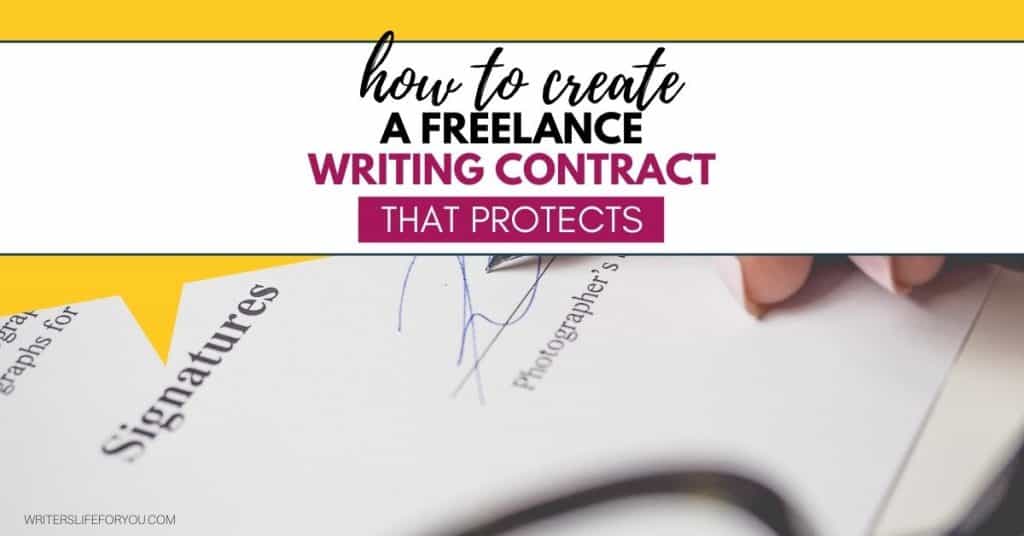




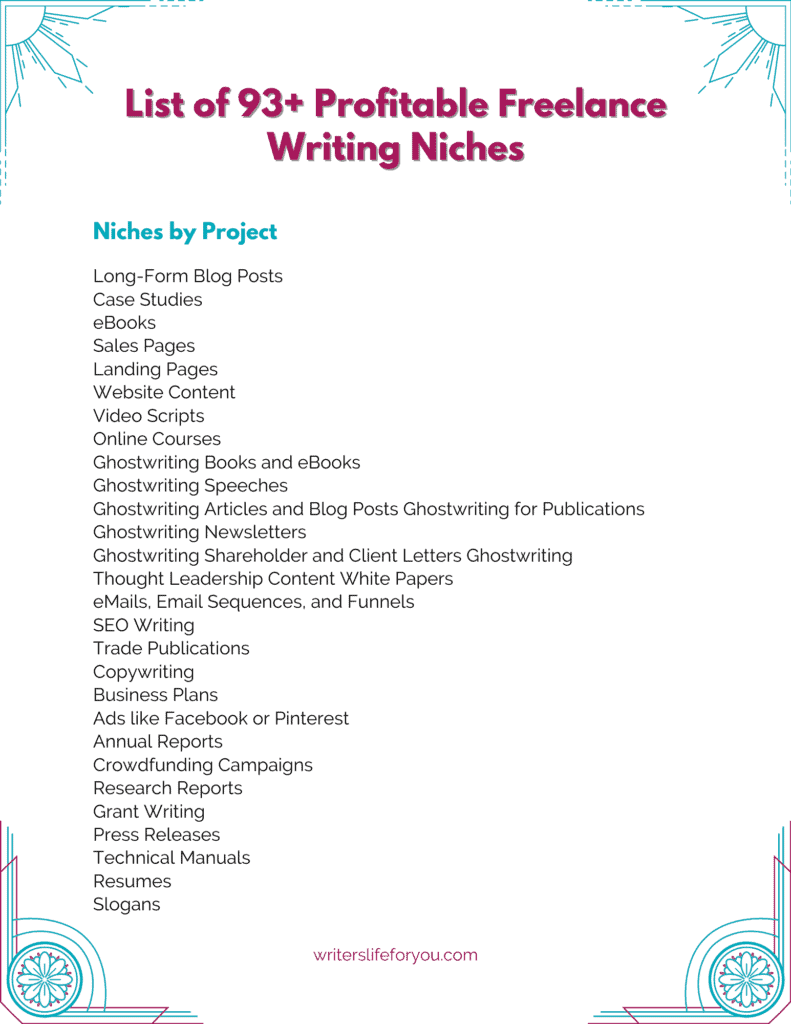




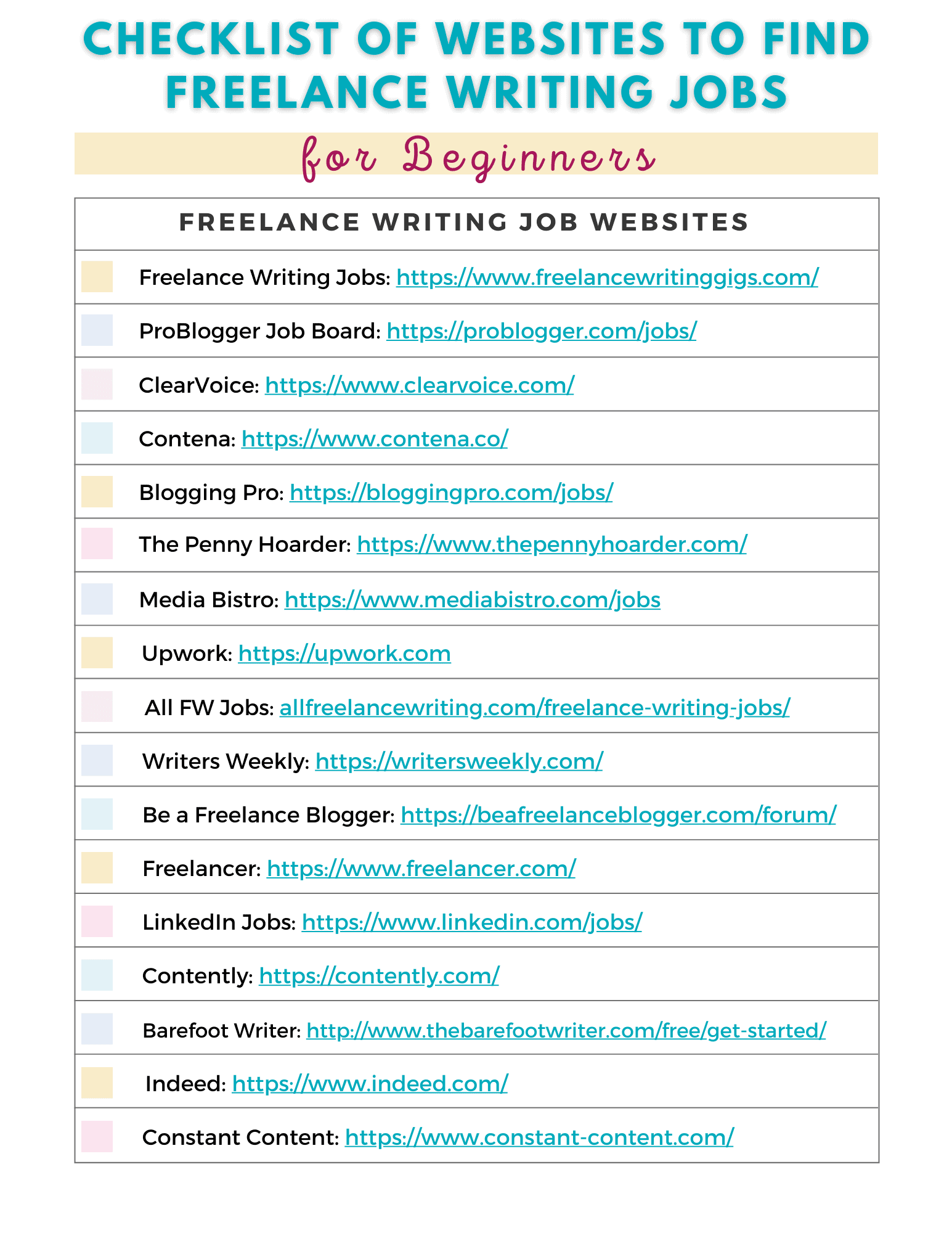

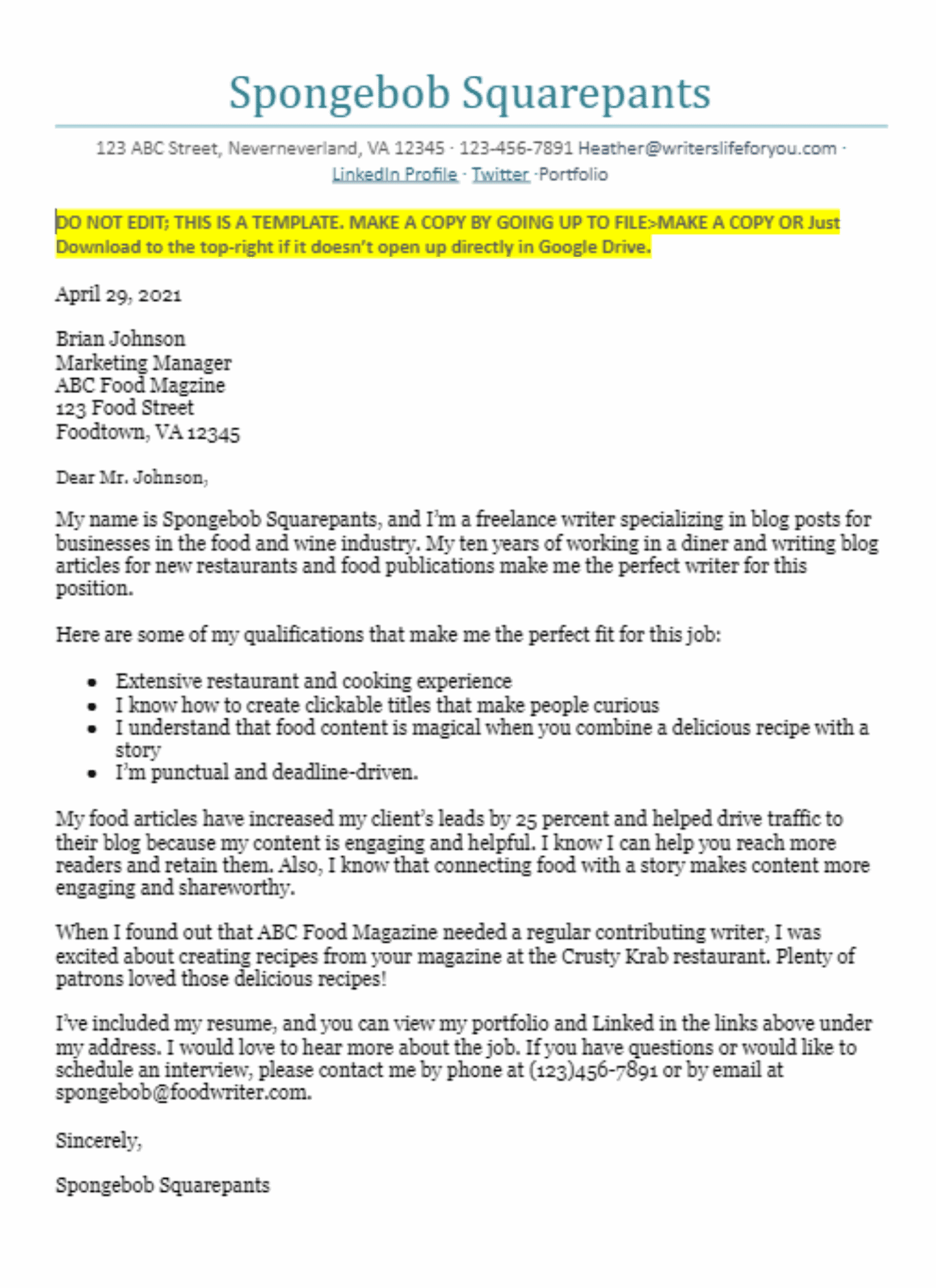








Thank you for this! Definitely a must for every business!
Yeah, you never can be too safe, right? Thanks!
Very important. Definitely a must have when you get started ?
It sure is. Thanks.
Thank you for this info!!! I love how detailed, yet easy to understand it is. I will definitely be using this as a guide to write my contracts for freelance work!
Thanks, Sarina. It’s one of those things that you don’t want to need but if you don’t have it and something happens…eeekkk!
Great read!!
Thanks Cierra!